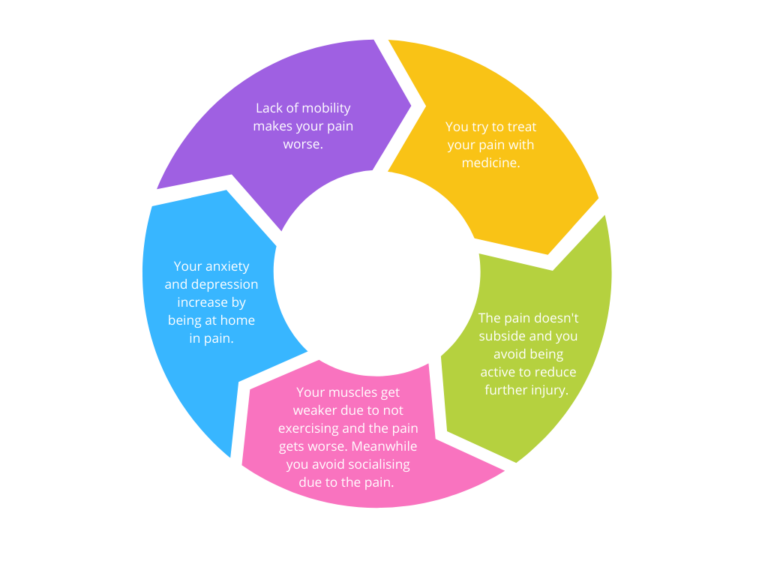What is Pain?
Pain is a sensory signalling system for physical threats to detect, warn and minimise contact with harmful stimuli (i.e. pressure, heat, cold) or to inform you to stop doing something that may cause further harm. People often assume that pain is a mere physical sensation. Nevertheless, pain consists of biological, psychological, and emotional factors. As pain is invisible and perceived subjectively, it is challenging to measure and understand the level of pain a person is experiencing. The severity and frequency of pain differ among individuals; therefore, clinicians create pain management plans specific to each person.
Pain Processing in the Body
Pain signals travel through the spinal cord to the brain, directly linked with the emotional centres in the brain. This means that your emotions can affect the level of pain you may be feeling (i.e. if a person feels angry, depressed or anxious, the pain worsens).
The Main Types of Pain Are:
- Acute (short term pain up to 3-6 months) that subsides or heals after the injury or illness.
- Chronic (more than 6 months), which is persistent pain due to developed health conditions such as arthritis, fibromyalgia, diabetes, cancer, heart attack, stroke, or post-surgical pain.

Ref: https://www.sbmfitness.com/single-post/2019/10/21/Opioids-and-pain-pills-can-be-dangerous
Pain may affect an individual’s ability to function when performing tasks at home, work or in an educational setting. One may find it challenging to continue with social activities and hobbies, leading to a decreased self-esteem, low mood and increased frustration.
Generally speaking, pain shares some biological processes with anxiety and depression (i.e. sleeping and concentration difficulties, feeling fatigued, having a decreased appetite, and mood changes etc.), which affects mental health and wellbeing. Moreover, it induces further challenges to physical mobility.
Emotional Pain
Emotional pain is a psychological pain that encompasses a range of emotions such as; anxiety, depression, guilt, grief, loneliness, anger or low self-esteem. Often, it is overshadowed by physical pain and viewed as less serious. However, it is important not to disregard emotional pain as it not only can negatively affect ones mental health but with time it may impact physical health too. It can lead to symptoms such as; headaches, muscle aches, stomach problems that may progress into more serious conditions. Moreover, if left untreated, individuals can develop negative coping strategies which can worsen their psychological or physical health. Coping strategies can include alcoholism, self-harm, eating disorders or any other addictions.
How Can Therapy Help Ease Your Pain?
Trauma-focused therapy can help to break the cycle of pain and aid in transforming thought patterns, feelings (i.e. reduce pain by learning to monitor own body, offer effective ways to cope with stress, as stress increases the pain) as well as behaviours (i.e. lifestyle changes that will enable a to continue participating in work and recreational activities) that accompany the pain.
